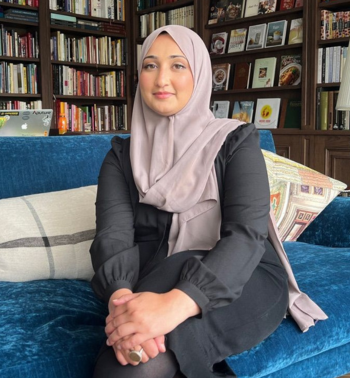4 April 2025
Marium Naqvi, interstitial lung disease pharmacist based at the Faculty of Life Sciences and Medicine, King's College London, explains how funding from the KHP Centre for Translational Medicine has transformed her AI research project.
Please tell us about your research?
Interstitial lung diseases (ILDs) are a group of lung conditions where inflammation and/or scarring can lead to symptoms such as worsening breathlessness, impaired quality-of-life (QoL) and reduced life expectancy.
Usual care for patients with ILD involves three to six monthly outpatient attendances to monitor the condition and response to treatment. These visits are burdensome for patients who are breathless and/or dependent on supplemental oxygen therapy. Home monitoring with remote clinician review could provide an alternative patient pathway to avoid follow-up delay and reduce subsequent impact on the patient, health service, and environment.
In the 12-month preliminary study called Remote Monitoring in ILD (REMILD), 186 patients with ILD were provided home spirometers and pulse oximeters. They were asked to perform weekly measurements and complete three-monthly patient reported measures (PRMs) using the patientMpower application on their smart devices.
The results were immediately available and alerts were triggered if the measurements were lower than the threshold, set to the individual's baseline. ILD specialist clinicians reviewed the alerts and made interventions, as appropriate.
How has funding from the King’s Health Partners (KHP) Centre for Translational Medicine (CTM) helped progress your research?
The results of the preliminary study demonstrated remote monitoring was safe, effective and acceptable for patients with ILD. However, significant clinician time and expertise was required to review the alerts, which did not accurately reflect the clinical condition in more than 50% of cases.
These false positive alerts saturated the system and required triage. The remaining alerts often identified acute exacerbations (AE) which has prompted us to ask the question, can remote monitoring support prediction of AE?
This funding has been vital to develop an academically led translational project to use artificial intelligence enhanced remote monitoring (AIRM) technology for the delivery of digital healthcare in patients with ILD. I aim to achieve this by:
- Utilising real-world data from the REMILD study to build rules-based and machine learning AI models to enhance the remote monitoring of patients with ILD so that only meaningful data is reported to clinicians and AE can be predicted.
- Validating AIRM technology in a feasibility study to determine the impact on safety, effectiveness and acceptability, in patients with ILD.
- Exploring the impact of AIRM technology on clinicians.
- Understanding patient perceptions of AIRM technology.
I am extremely fortunate to have secured the pre-doctoral clinical research fellowship funding, which has allowed me to develop a multi-partner venture and formalise a steering committee including international experts of diverse disciplines with research, clinical, data science, technology acceleration, and patient expertise.
In addition to co-designing and co-developing my research, I have been able to undertake vital training and courses in project management, data science and research leadership. This would not have been possible without funding and support from CTM and the wider King’s College London network. It has been an incredible experience to be part of this inclusive, collaborative, and supportive group of interdisciplinary professionals.
How does your research have the potential to benefit patients and reduce health inequities?
AIRM technology has the potential to:
- Enable remote monitoring to be upscaled so more patients can access specialist care and fewer patients experience health inequities.
- Reduce the burden and costs associated with hospital outpatient visits and emergency admissions.
- Support early identification of disease progression disease or AE and timely access to treatments which can support delivery of personalised care in the home so patients with ILD can live better lives.
- Demonstrate efficiencies in the healthcare system, including clinician time, so more time can be spent delivering high-quality bespoke patient care.
- Use predictive modelling to measure, monitor, and understand individual and population scale disease and variation in phenotypes.
- Mitigate the environmental impact of health and care delivery.
- Improve patient acceptability of AI-supported health technology to encourage self-management, improved knowledge, and confidence.
How does working within KHP benefit your research?
Prior to this pre-doctoral clinical research fellowship role, I had been the deputy clinical lead and ILD pharmacist at Guy’s and St Thomas’ NHS FT for several years and gained significant clinical, research, and leadership experience. It has been invaluable to have remained under the auspices of KHP and to have benefited from continued access to data, patient and public engagement/involvement, and governance and ethics approvals across the partner organisations. I am hugely grateful for the generous support and guidance of the group, department, CTM, and experts within the wider university structure.
Marium Naqvi is a King’s Health Partners Centre for Translational Medicine pre-doctoral clinical research excellence fellow and ILD pharmacist, Faculty of Life Sciences and Medicine – Peter Gorer Department of Immunobiology headed by Dr Richard Russell, and King’s Centre for Lung Health, headed by Prof Mona Bafadhel.
The Centre for Translational Medicine brings together the organisations of King’s Health Partners and generous funding from the Guy's and St Thomas' Charity to work in partnership to improve the health of people locally, nationally, and globally.
This is through accelerating research and innovation that improves the detection, prevention, and treatment of disease.
The Centre for Translational Medicine aims to:
- address the major health burdens for local, national, and global communities – and to challenge existing health inequalities;
- combine our outstanding clinical and scientific expertise to deliver excellent outcomes for patients;
- develop the next generation of clinical-academic leaders, skilled in delivering impactful translational biomedical research.
For more information about the Centre for Translational Medicine and its funding offers, email: translationalmedicine





